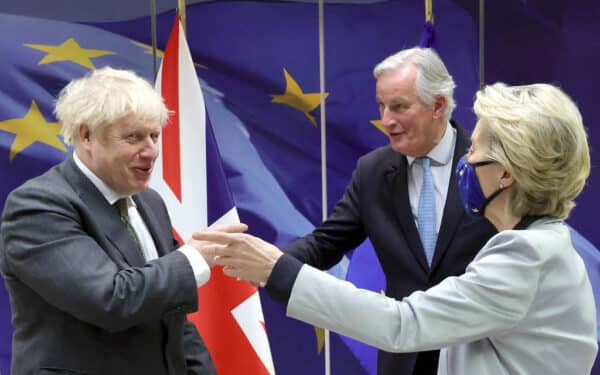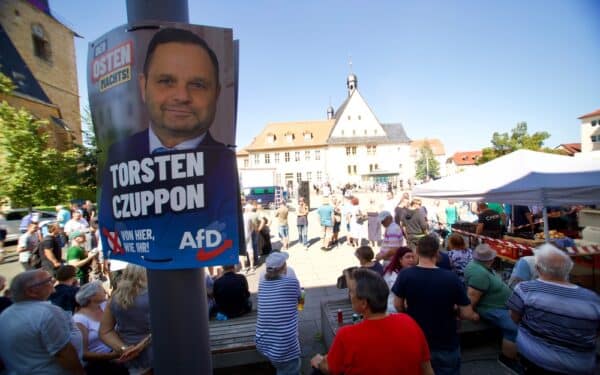Another week, another comedy of errors in Westminster. Health secretary Jeremy Hunt has told foreign secretary Boris Johnson to keep his disagreements over Brexit private. Things are in disarray just as the UK government gets down to the gargantuan task of establishing a new commercial relationship with the continent.
Regardless of whether you love or loathe it, a common tendency of our analysis of the Brexit negotiations is to pour scorn on Theresa May’s ‘cabinet of chaos, and admiration on their European counterparts for displays of indomitable resolve and unity. This cabinet confusion is naturally an expression of British ambivalence towards the continent as it bumbles towards a new relationship with its mainland neighbours.
The dividing line of Brexit is our inheritance from a centuries-long strategic contestation. For over four hundred years, since the Thirty Years’ War (1618-48) when crypto-Catholic and Protestant statesman vied to dictate the focus of the nation’s foreign policy, we have been torn between the mainland and the high seas.
You’d be forgiven for thinking that this preoccupation regarding one’s place in relation to Europe is a uniquely British phenomenon. After all, we are the only country to have voted to leave the European Union thus far.
Scratch the surface, however, and you will find a more complicated picture. Preoccupations with one’s place within the continent, the ‘Europe Problem’, are an permanent feature in all over the continent.
Take Germany, the poster child for European integration. It is hardly news that Germany has its own form of euroscepticism. In elections to the German parliament last September, 90 seats went to the rightist eurosceptic Alternative for Germany (AfD) party. A more interesting example, thought, is the Reichsbürger (‘citizens of the Reich’) Movement, a loosely connected group of extremists who reject the legitimacy of the Federal Republic of Germany and its institutions. Their reasoning: that a ruling from Germany’s Supreme Court in 1973 upheld the fact that the Weimar Constitution was never properly abolished by the allied forces and therefore remains valid. In other words, they argue, modern ‘Germany’ is simply a construct made by the Western powers to keep the ‘true’, imperial Germany down. (Note that they do not cite the Supreme Court’s further holding that the Federal Republic is not a successor state to the Reich, but a West German state which came to assume a form fully identical to it.)
On the face of it, the Reichsbürger are extreme right-wing fanatics. Yet right-wing fanaticism teaches us a lot about the ways in which the idea of Germany is contested, and how Europeans are just as unsure about Europe as we are.
The Reichsbürger frequently show their rejection of the German state by founding their own ‘statelets’. For example, in the town of Königsfeld they have ‘founded’ the ‘Free State of Prussia’, complete with its own ‘head of government’ and an ‘interior minister’. Of course, this ‘state’ exercises no real sovereignty, but is nonetheless interesting for illustrating how rejections of ‘Germany’ are often framed in terms of aspirations for an antediluvian Prussian past — for a state which has not existed since 1945.
Indeed, ‘Prussia’ has cast a long shadow over Germany for decades, its power to polarise never waning. For many Germans, it is a byword for all that is bad in German history: militarism, arrogance and illiberalism. In February 2002, Alwin Ziel, a Social Democratic minister in the Brandenburg state government, achieved notoriety when he intervened in a debate over a proposed merger of the city of Berlin with the federal state of Brandenburg. ‘Berlin-Brandenburg’, he argued, was a cumbersome word; why not name the new state ‘Prussia’? This caused a huge backlash in the media. Historian Hans Ulrich-Wehler, responding to Ziel’s question, summed up this sentiment in a piece for the centre-right daily Frankfurter Allgemeine Zeitung entitled ‘Prussia Poisons Us’.
However, the idea of ‘Prussia’ has re-established itself as a slogan for sections of the German right, who see in its ‘traditions’ a counterweight to the disorientating, Kafkaesque cosmopolitanism of Federal Republic. Since 2013, it has been the AfD peddling this. Last year its Thüringen branch leader, Björn Höcke, called for a revival of ‘Prussian values’. Their proposals take aim at the ‘multikulti’ (multiculturalism) of Chancellor Merkel’s Germany; these include reducing immigration and banning refugees from bringing close relatives from war-stricken countries to Germany. Just as Brexitism is itself an expression of historic contestations over what sort of country the Britain should be, the rise of the Reichsbuerger and the AfD is a symptom of German uncertainty in their imagination of themselves.
Significantly, euroscepticism is a by-product of this contestation, with the AfD calling for Germany’s strategic reorientation away from Europe and towards Russia. The party’s joint election candidate Alexander Gauland in March rebuked Merkel for expelling Russian diplomats from the country after the Salisbury attack. The AfD thus taps into east German tendencies towards ‘middle Europe’, away from the West. This has been made all the easier by widespread dissatisfaction amongst Germans with the way the economy has developed since reunification. While astonishingly productive, there is growing inequality in Germany; the share of households below the official poverty line of 60% of average earnings (€917 a month after tax for a single person) was 15.7% last year, compared to 14.7% in 2005. In a country whose culture prizes the notion of ‘Ostalgie’, economic downturn lends credence to ideas which criticise Western projects. The most obvious example of this has been the AfD’s attack on Merkel’s decision to take in a million asylum-seekers from Syria and Iraq.
This is important to remember when thinking about a country which the British media consider the paragon of European integration. AfD leader Alice Weidel has made scathing attacks against Merkel’s for using taxpayer money to fund EU projects. In short, Germany’s own brand of ‘Prussian’ Euroscepticism shows it is not immune to the strategic contestations which plague British politics. Europe is far from the safe in the German psyche.
In fact, as the rise of the Reichsbürger movement shows, we are finding that euroscepticism in Germany is radicalising. The German intelligence service, the Federal Office for the Protection of the Constitution (BfV) has estimated that there are about 18,000 people who support the Reichsbürger movement — about 80 percent more than in 2016. Nor are these followers insignificant members of German society — many are employed by the civil service or the military.
At this point, it is difficult to say whether euroscepticism will make any real inroads in Germany. While Germany now has a functioning government, some polls now put AfD ahead of the governing SPD. Appreciating the complex landscapes of a country which we take to be unreservedly European can nuance our understanding of the way we relate to our neighbours. Britain is not alone in grappling with its place in the world.



